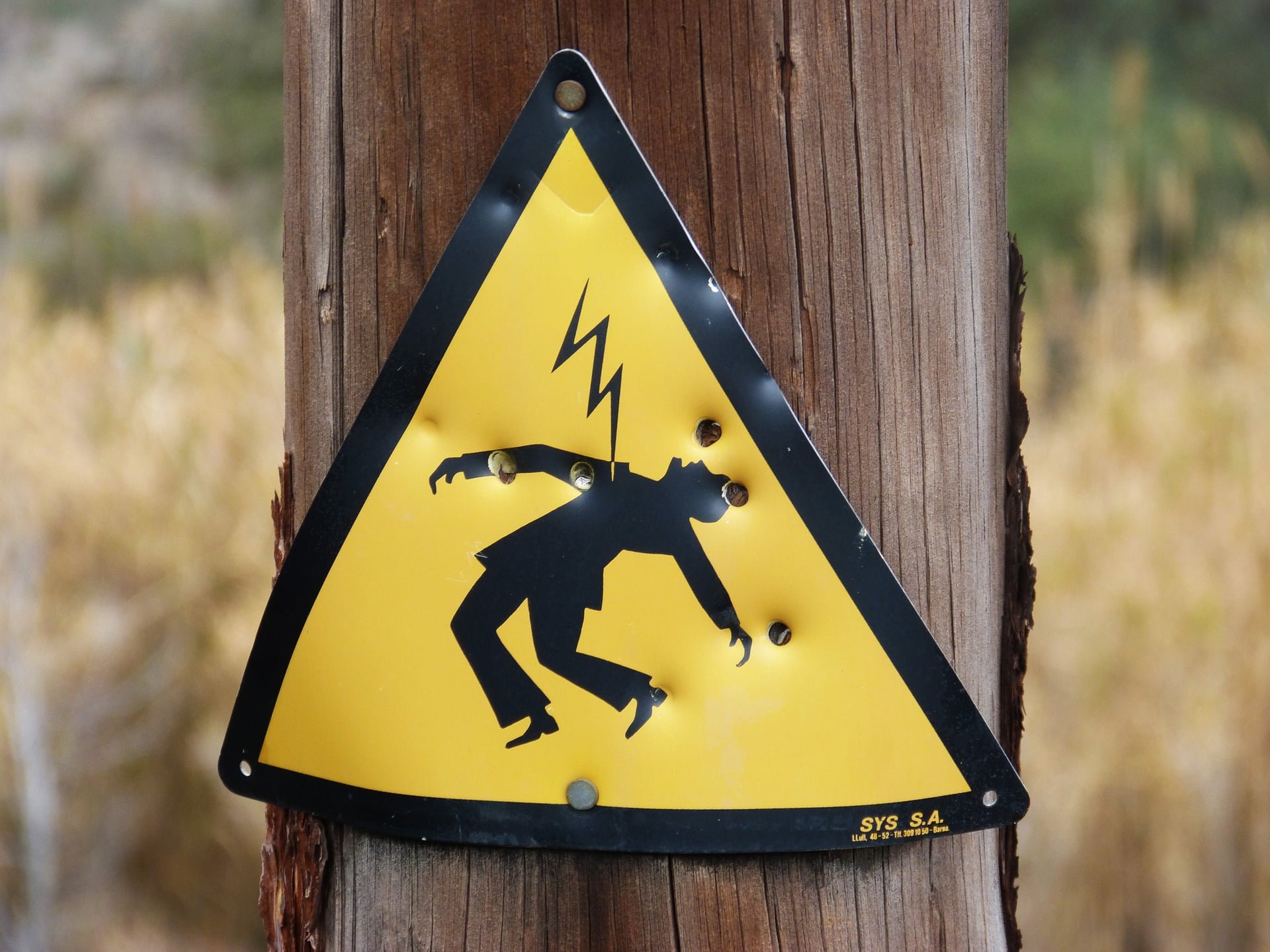Aussies may be relaxed by nature, but if there’s one type of emergency you should never take any chances on, it’s an electrical emergency. Electrical hazards at home can lead to loss of life, serious injury, fires and destruction of property. Poor management of a hazard can not only put your life at risk but also endanger your family, neighbours and the people you’ll be relying on to make repairs. So, what precautions should you take and when should you contact a 24-hour electrician?
Before you read on, stop and ask yourself:
Are you experiencing a life-threatening emergency?
If so, call 000
Is your emergency caused by a flood, storm, tsunami or earthquake?
If so, call the SES now on 132 500
Have you informed your electrical supply company?
If not, call now:
Once you’re clear of danger and everyone’s safe, be sure to complete an electrical incident form.
Common electrical hazards at home
One of the factors that make electrical hazards so difficult to manage is our inability to easily identify the danger. There can often be no obvious signs of a live electrical hazard, or the danger may seem over. It’s important that you never underestimate the potential hazard. This is not the time to be relaxed or cavalier, regardless of how confident you are.
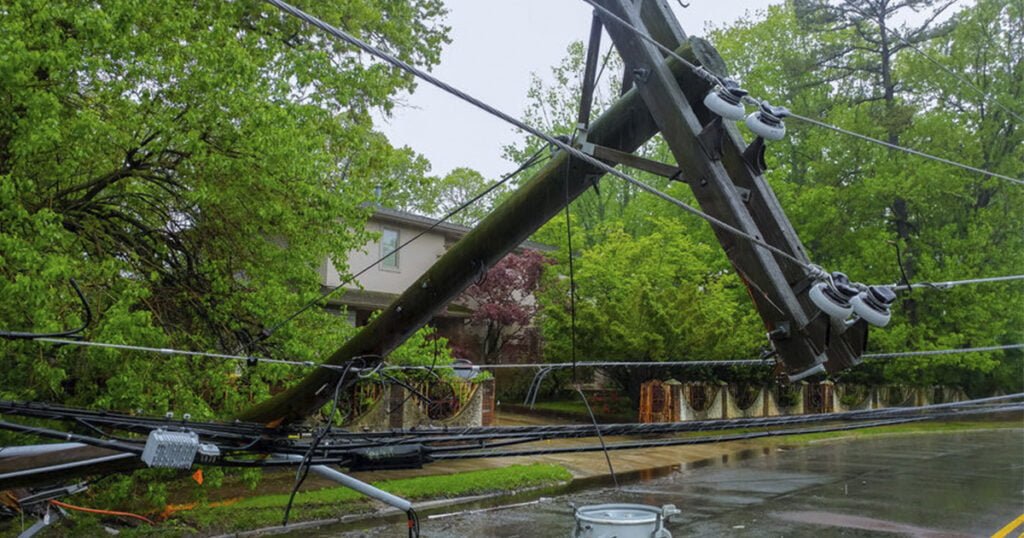
Fallen powerlines
If you suspect any person is the victim of electrocution, call an ambulance immediately.
Any fallen powerline must be considered live and potentially fatal. A broken powerline can create a long current via any conductive object it touches, so the area of risk could spread many metres beyond the location of the powerline.
Materials and objects that can carry current include metals (e.g., fences and gutters), green timber, cars, poles, water and people! Since we often can’t see the signs of a live current, it’s best to overestimate the risk. Energy Safe Victoria recommends people stay 8-10 metres away from any powerline but given the potentially fatal results of an electrical shock, stay as far away from the fallen powerline as possible.
Contact the police and your energy supply company. Be aware of the location of the broken line so you can ensure the authorities and company can quickly and safely get to the right spot.
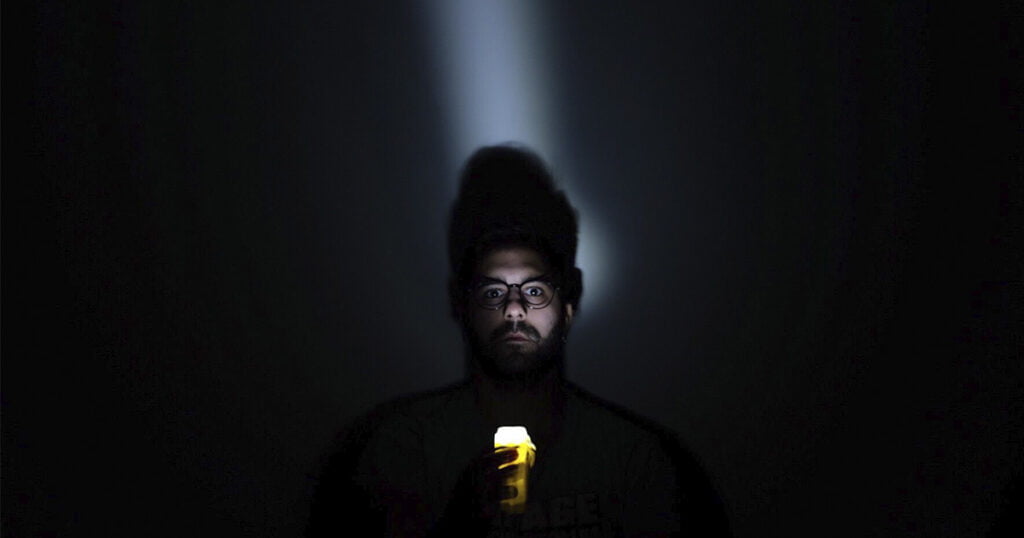
Power outages due to broken powerlines
Outages can occur for many reasons but if a power outage occurs during times of high winds or storms, it may be due to a broken powerline. In this scenario, it’s difficult to ascertain where the broken line may be. The safest thing to do is stay where you are, but if you need to leave the house for any reason, you must be aware of the possibility that the broken line could be local.
Report the outage to your electricity supply company and check their website or app for outage details.
Power outages due to damage to your home
The fault may be occurring on your property. If so, never try to repair the issue yourself. DIY electricity repair is not only dangerous, but also illegal! Why risk it when there are so many qualified and insured electricians available 24 hours a day? Finding an emergency electrician in Melbourne isn’t hard. They can save you time and money. They may even save your life!
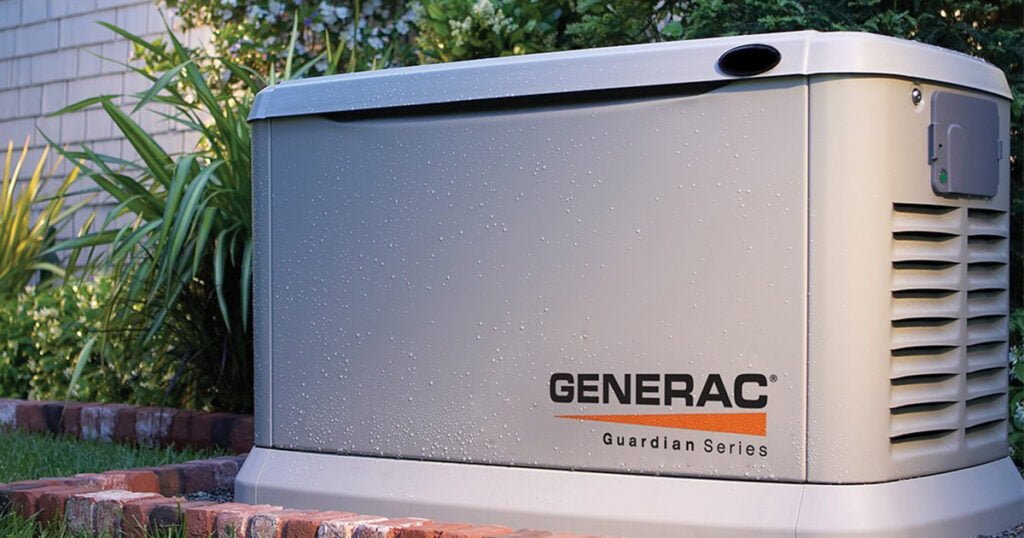
Generators
Do you own a generator that hasn’t been connected to your home’s wiring? If you’re in the middle of an emergency, now is certainly not the time to start connecting it! It’s too risky. You should always get your temporary generator connected by a qualified electrician. Again, it’s not hard to find a 24-hour electrician in Melbourne. If there’s no immediate danger, an electrician could have your home hooked up and powered by a generator within a couple of hours.
If you don’t have a generator, read on for a few tips on staying safe, well lit and well fed during the outage.
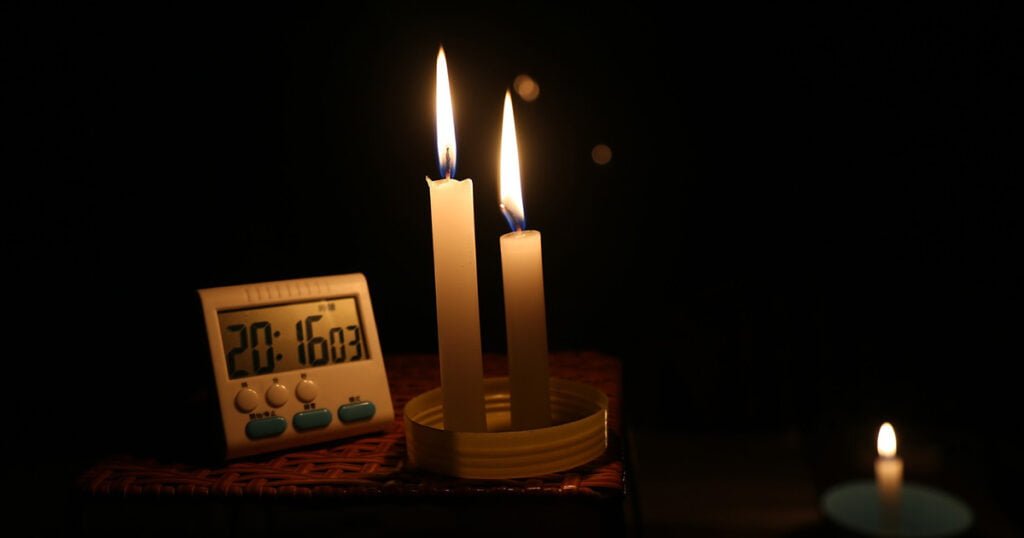
Surviving the power outage
You should always have an alternative source of light handy, such as candles or flashlights. You may not be in immediate danger of getting an electrical shock but tripping over objects in the dark presents its own risks. Also, remember that it’s easy to make the mistake of putting a flickering flame too close to a flammable object.
To be safe from possible power surges that can damage your equipment, make sure you turn off appliances at the wall and unplug them.
Planning to cook up a feed in the dark? That’s fine if your gas cooking device doesn’t require any electricity. But don’t start dragging your outdoor cooking equipment (e.g., barbeques) into the kitchen! Only use indoor cooking equipment.
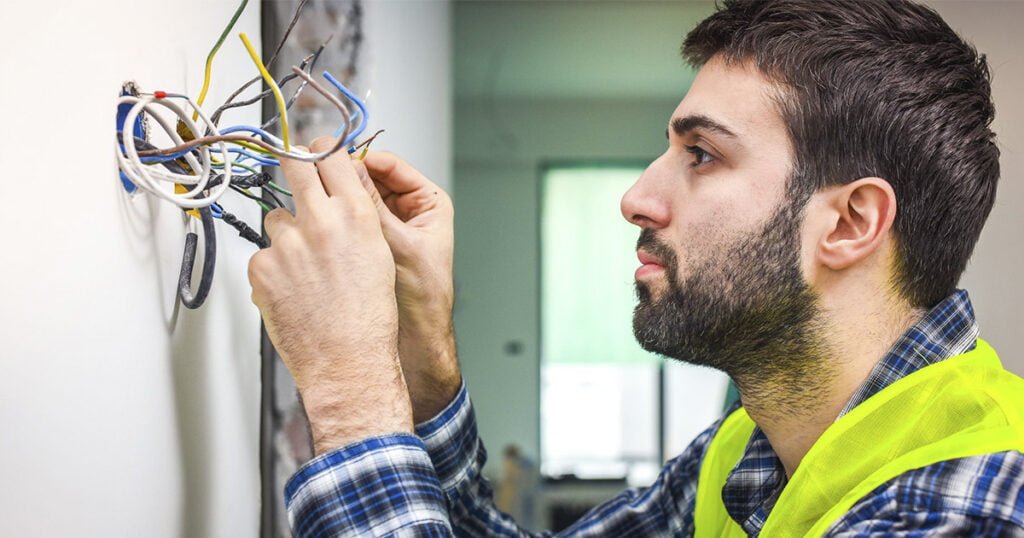
Faulty equipment and loose wires
Unfortunately, while we’re listing the most common electrical hazards at home, we have to include amateur handymen! You may be fascinated by the way things work. You may also be on a tight budget. But trust us, there has never been a reason that could possibly justify the potential hazards associated with amateur electrical work.
Twin Electrics and Plumbing has been in the business for more than 40 years, and if there’s one thing that makes us anxious, it’s DIY electrical work. If you can plug it in, you shouldn’t be taking it apart. Instead of touching or attempting to repair any faulty equipment, just cover it up and call an electrician.
Energy Safe Victoria calls it DDIY (don’t do it yourself) and we’ve been championing the cause. We’ll address this issue further in our safety guides but for now, make sure you don’t try to repair anything that involves wiring or power. Twin Electrics & Plumbing has a fleet of 30 vans covering the entire Melbourne metropolitan area, so if you need emergency electricians in Melbourne, just get in touch. We’re licensed and insured. We’re happy to prove it when our technicians visit your home.
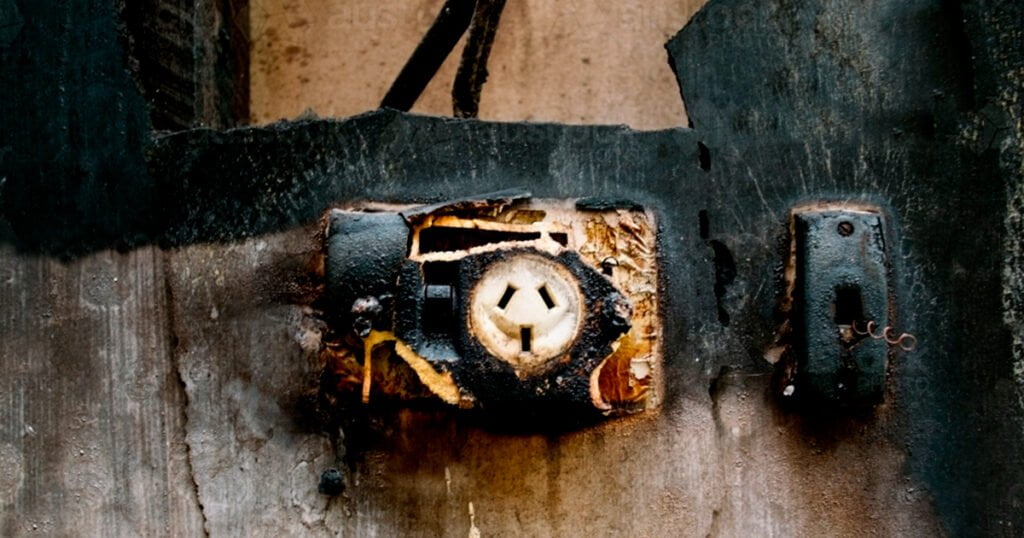
Stained or burnt electrical outlets
One of the most common electrical hazards at home is a burnt or overloaded outlet. If you’re seeing any dark marks around outlets, you already have an issue. The risk of creating an electrical fire is high. These issues have many causes such as overloading, faulty wiring, malfunctioning components, and broken appliances, to name just a few. With so many potential origins, the issue requires the attention of a qualified electrician, and every hour you delay moves you closer to hazardous conditions.
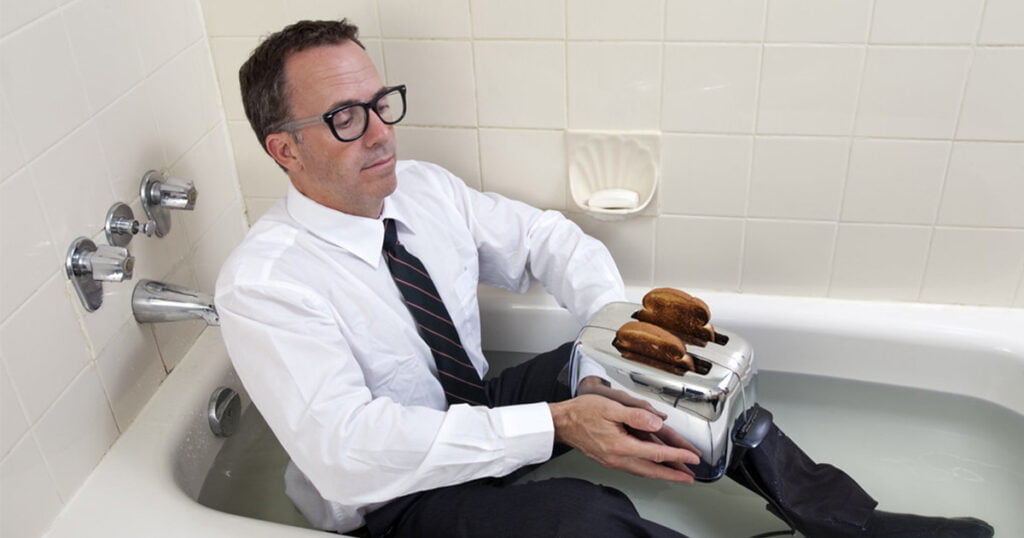
Electricity and water
You must never touch any wet area that is potentially in contact with electricity. Even the smallest appliance can generate a serious shock and result in injury or death. It’s simply not worth the risk. You can’t safely touch the appliance until you’re sure the risk has been eliminated.
What eliminates the risk? Shutting down the electricity supply at the mains. Is this something you should do yourself? If there’s water in the home for any reason, you could be seriously injured when you attempt to turn of the electricity to your home. Call a reliable 24-hour electrician who is trained to deal with hazardous conditions.
Electrical hazards at home – the updated guide
If you can think of any electrical hazards to add to our guide, please comment below. We’re planning to make this a comprehensive and current guide to common electrical hazards at home, so we’ll be updating the page regularly. Make sure you bookmark it so you can quickly get advice in the event of an emergency. For preventive measures, visit our blog regularly to check for more safety guides.
